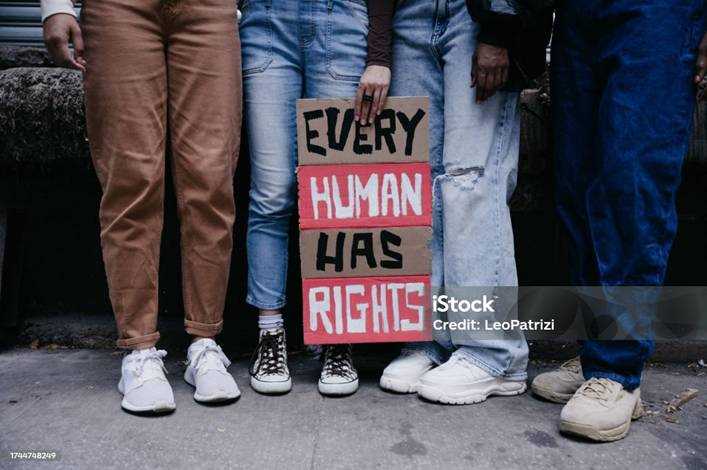
In Zimbabwe, sexuality has mostly been viewed in the binary sense, men love women and vice versa. The running principle is opposites attract and like poles repel. Any notion outside these principles is viewed as taboo.
LGBTQ community struggles to fit into Zimbabwe’s thick moral fabric
Zimbabwean law does not recognise the rights of the LGBTQ community, prohibiting same sex marriage in Section 78 of the National Constitution. The Criminal Law (Codification and Reform) Act also criminalises consensual sex between men as well as “any act involving physical contact … that would be regarded by a reasonable person to be an indecent act”.
This legal position has been cemented into the country’s political discourse on sexuality, being used as a trigger point in past electoral campaigns to assassinate characters or de-campaign political parties. A political opponent is said to be “gay”, while a political party is discredited by insinuating that if elected, they would accommodate LGBTQ rights. As a result, there has been very little scope to openly discuss the deeper nuances of the subject.
Another huge factor which has contributed to the heightened judgment against the LGBTQ community is the manner in which most Zimbabweans were socialised. From a religious and cultural perspective, heterosexuality is a norm that was taught to the average Zimbabwean child at home, in school, in the media and even at church.
The above socio-political stance on the issue of sexual orientation has contributed to discrimination and negative representation of sexual minorities in the country, confining the plight of the LGBTQ community to the margins.
Social media: a façade of inclusivity
On the surface, it seems social media has created an outlet for people to openly discuss the issue of sexual fluidity.
Research conducted by ZimFact in collaboration with Code for Africa shows that, in 2,432 conversations that made reference to the issue of sexuality scraped from various social media platforms between January and September 2025, 40% were negative, while only 5% were positive. Interestingly, 55% of the conversations were neutral, suggesting some level of open-mindedness that some people have regarding the subject.
Despite giving the public an opportunity to discuss topics that were considered taboo in traditional setups, social media has been a breeding ground for misinformation and disinformation on sexual minorities. It has also led to hate speech, insults and discrimination against sexual minorities.
Attempts by some online content creators like ChimandaTV and DJ Sparks to give the spotlight to some members of the LGBTQ community have been met with mixed responses and have also exposed some misconceptions that people have about sexual minorities.
Gossip platforms like ZimCelebs have used content featuring members of the LGBTQ community as clickbait to boost engagement on their pages, which often leads to gay-bashing.
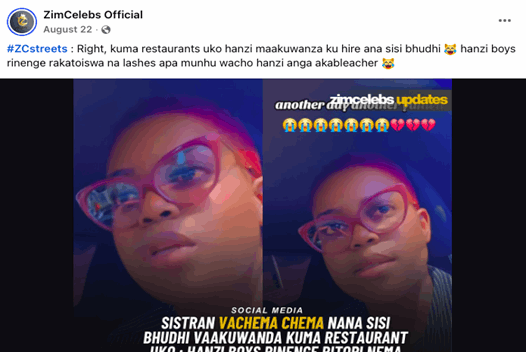
A case in point is a post shared by ZimCelebs, of a certain lady saying she had declined to be served by a ‘gay waiter’ at a local food court. She was alarmed that the food court was hiring members of the LGBTQ community. Zim Celebs captioned the post, “Right kuma restaurants uko hanzi makuwanza kuhire ana sisi-bhudhi, hanzi boys rinenge rakatoiswa malashes apa hanzi munhu wacho hanzi anga akableacher,” which loosely translates to, “Right, we hear restaurants are hiring too many gay men, we hear the guys are wearing lashes, this guy was said to have bleached his skin”.
This post generated a lot of feedback with 437 comments and more than 800 reactions on Facebook. It also endangered the life and well-being of the subject, who was being actively sought out in the comment section, with some asking, “Which restaurant is this so that we do not go there?”
A local association of LGBTQ people in Zimbabwe, GALZ, raised concern over the portrayal of sexual minorities in the media, noting that coverage “is built on ridicule rather than respect. These portrayals may appear humorous to some, but they reinforce stigma and make it harder for LGBTQ people to live safely and with dignity”.
In some viral content, bloggers have been targeting gay sex workers to discuss graphic details about their work, further undermining their human dignity instead of mainstreaming their plight.
In 2024, a report by GALZ showed that the organisation handled 30 cases of violations against members of the LGBTQ community, with 23% of these cases resulting from physical assault and violence and 7% emanating from institutional harassment.
These statistics show the high likelihood of online targeting of members of the LGBTQ community translating to offline threats. GALZ revealed that “in 2022, a gay man in Harare was lured through social media under the pretext of friendship but was instead subjected to extortion and threats of exposure and in Bulawayo, derogatory memes circulated about a lesbian couple led to one of them being evicted by their landlord after neighbours shared the posts and pressured the landlord to act”.
Interestingly, while everyone gets to talk about the LGBTQ community, there is limited room for the LGBTQ community to openly interact with other communities, not only on issues linked to their identities but on broader bread-and-butter issues.
Social media trends on the representation of LGBTQ issues
A look at the commentary on the numerous conversations scraped from social media shows various trends that emerged reflecting perceptions about the LGBTQ community, as well as common misinformation and disinformation.
Firstly, while the subject of sexuality is generally viewed as a sensitive topic and treated with a lot of political correctness in the mainstream news platforms, ZimFact observed that this was not the case on social media.
The description “gay” is commonly used as an insult, especially when there is a clash of perspectives on discussions relating to a wide range of issues, including politics, economics and social issues. Although these seem like harmless insults, they contribute to the strengthening of stigma against the LGBTQ community.
Prominent personalities are usually on the receiving end of these slurs. Musician and businessman Ian Mtandwa, popularly known as “Mudiwa Hood”, had to take legal action against some individuals for cyberbullying him.
Part of his post on X on 2 February 2025 reads: “…I am also filing lawsuits for defamation of character against everyone including bloggers, podcasts, and social media pages who spread false information that caused great harm to my brand, and everyone who called me GAY/Ngochani/Ngito on any platform…”
Related Stories
There were, however, some instances where the insults turned into threats of violence. In one case, whilst commenting on an episode of DJ Sparks’ podcast, in which he interviewed an unidentified member of the LGBTQ community.
Some of the people in the comments section threatened violence against gay people. @CChampion posted in the comments section, “Bro I don’t wanna lie if I meet those people I want to fight them…” In response @Eremina Regina Tarirai commented, “I feel angry, these people need to be beaten”.
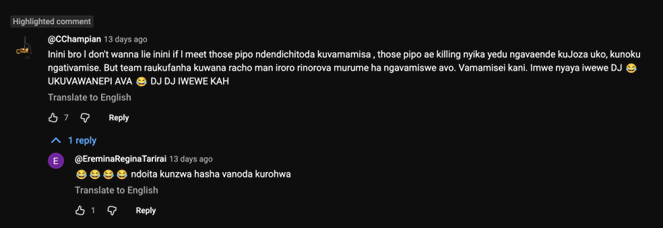
In a more extreme case, which resulted in xenophobic comments against a young gay Zimbabwean YouTuber, Ndoyisile Ndumiso Sibindi, based in South Africa. A video clip of Sibindi joking about people from Thembisa causing overcrowding at the Mall of Africa was posted on X after being originally posted on TikTok by Black_Woman01.
The video was posted in January 2025 and has more than 3 million views. It resulted in a barrage of discriminatory comments, most of which reminded him that he is a foreigner in South Africa and that he cannot fully exercise his gay rights back home in Zimbabwe. Below are some of the comments on the post:
● @ISephara: Did you know? In Zim the Criminal Law Act says Gay men can be imprisoned up to 12 months in jail Instead of using their time to fight for equal rights legislation in Zim they're worried about Sans (South Africans) spending their own money in local Malls
● @nkulipp: He can't even enjoy the freedom of being gay in Zimbabwe, but he has guts to complain about South Africans enjoying their infrastructure.
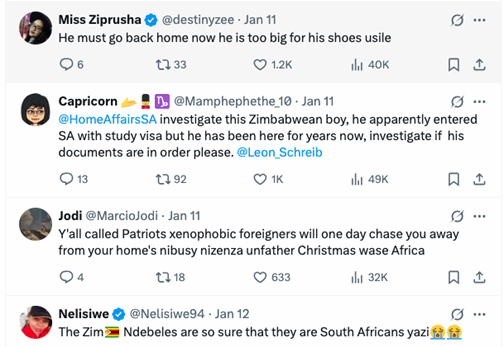
The idea that one’s sexuality is depicted in how they dress or groom themselves was a common issue. One prominent and recurrent storyline was constant attacks against Admire Mushambi, a comedian who plays a character called Mama Vee. When in character, he wears a dress; as a result, he is labelled gay on social media for his portrayal of this character as well as his fashion sense in real life.
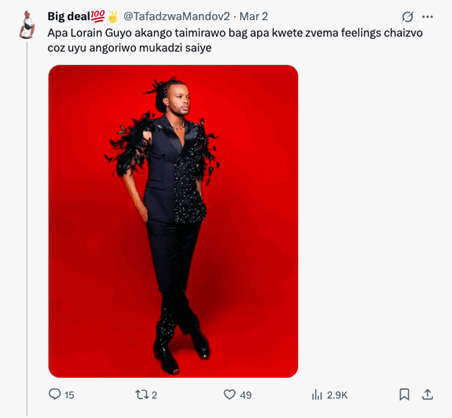
The notion that being gay is illegal in Zimbabwe was a common misconception in the posts that were reviewed. Many people appeared to be shocked at seeing interviews featuring members of the LGBTQ community and questioned its legality. This can be seen in commentary on Chibanda Media’s Bishu (Season 1 Episode 62) in which the host Manass Chibanda interviews a gay sex worker. People in the comments, such as users @MaiTee-i9v and @LindaGonese, ask if it is allowed to be gay in Zimbabwe or categorically say it isn’t.
However, while the law criminalises same-sex marriage and homosexual intercourse, it is not illegal to identify as gay in the country.
The limited understanding of issues relating to sexual identities was reflected in the reception of the news that seven intersex individuals have taken the government to court to demand recognition and protection under the national constitution. When ZimCelebs posted the issue on its Facebook page, a portion of the 1,600 people who commented on the issue had no idea what intersex means or had an idea but saw no merit in pursuing the case. One Learnmore Masomere replied, “I have a question. How does he/she identify in public?? Get the answer? Then stick to that, let's not complicate things for no reason. Just a marker on a form doesn't change much anyway”.
Some of the people in the comments blamed the confusion on how ZimCelebs framed its teaser in the post.
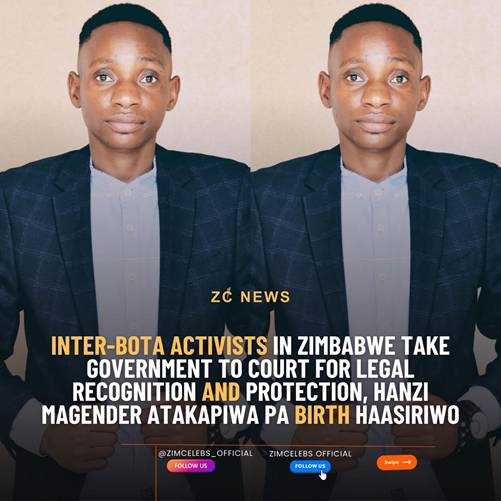
Post by ZimCelebs. Translation: “Intersex activists in Zimbabwe take government to court for legal recognition and protection, saying the gender we were assigned at birth is not what we identify with.”
Maureen Rukwava commented, “Saying INTER BOTA has confused people. Wrong journalism. The moment you say bota people rush to think of the actual activity itself, not sexual orientation”.
GALZ told ZimFact that most of the misinformation and disinformation noted above is far from the truth. The organisation offered some truths that the Zimbabwean community should be aware of about the LGBTQI community.
▪ First, we are part of Zimbabwean society and have always been here.
▪ Second, our identities are not foreign but reflect the same diversity found across African history.
▪ Third, we contribute to our families, communities, and the economy in positive ways.
▪ Fourth, like everyone else, we deserve equal protection from violence and discrimination.
▪ Finally, our lives are about love, dignity, and resilience, not the stereotypes that are often imposed on us.
Building towards inclusive and sensitive media coverage
It is clear from the prevailing trends of coverage and the tone in conversations analysed that there is a need for collaborative efforts to promote inclusivity and tolerance for sexual minorities in Zimbabwe. The media have an important role to play in dispelling existing stereotypes about the LGBTQ community through their content.
It is prudent for the media, particularly alternative platforms, to adopt ethical reporting guidelines that respect the rights of all communities, including LGBTQ people. This means consulting with affected groups when producing stories, avoiding sensational language, and ensuring balanced coverage that highlights real issues such as access to health, housing, and employment.
It is also evident that journalists need training on understanding sexual orientation, gender identities, and human rights. This can help enhance their knowledge of the various nuances of the LGBTQ community, which helps to reduce reliance on stereotypes.
This article was produced with mentorship from the African Digital Democracy Observatory (ADDO) as part of an initiative by the Ministry of Foreign Affairs of Norway and Code for Africa (CfA). Visit https://disinfo.africa/ for more information.










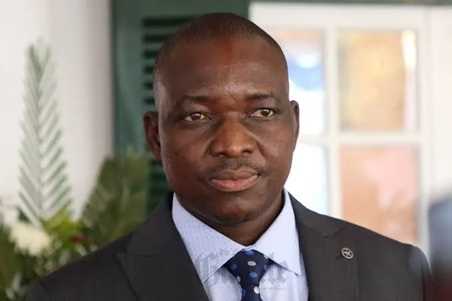
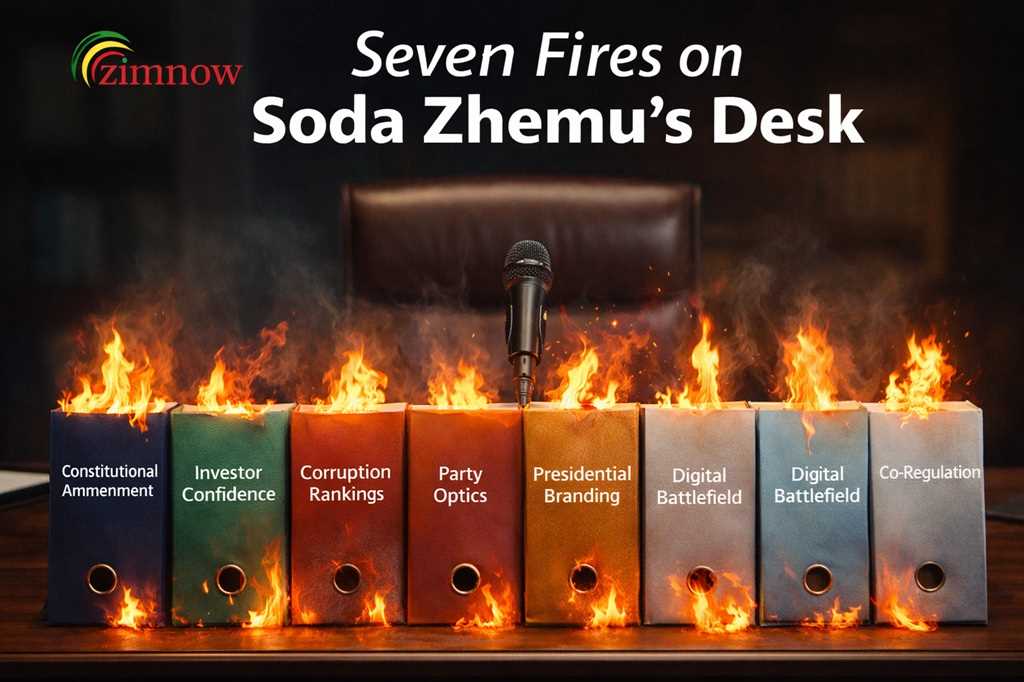
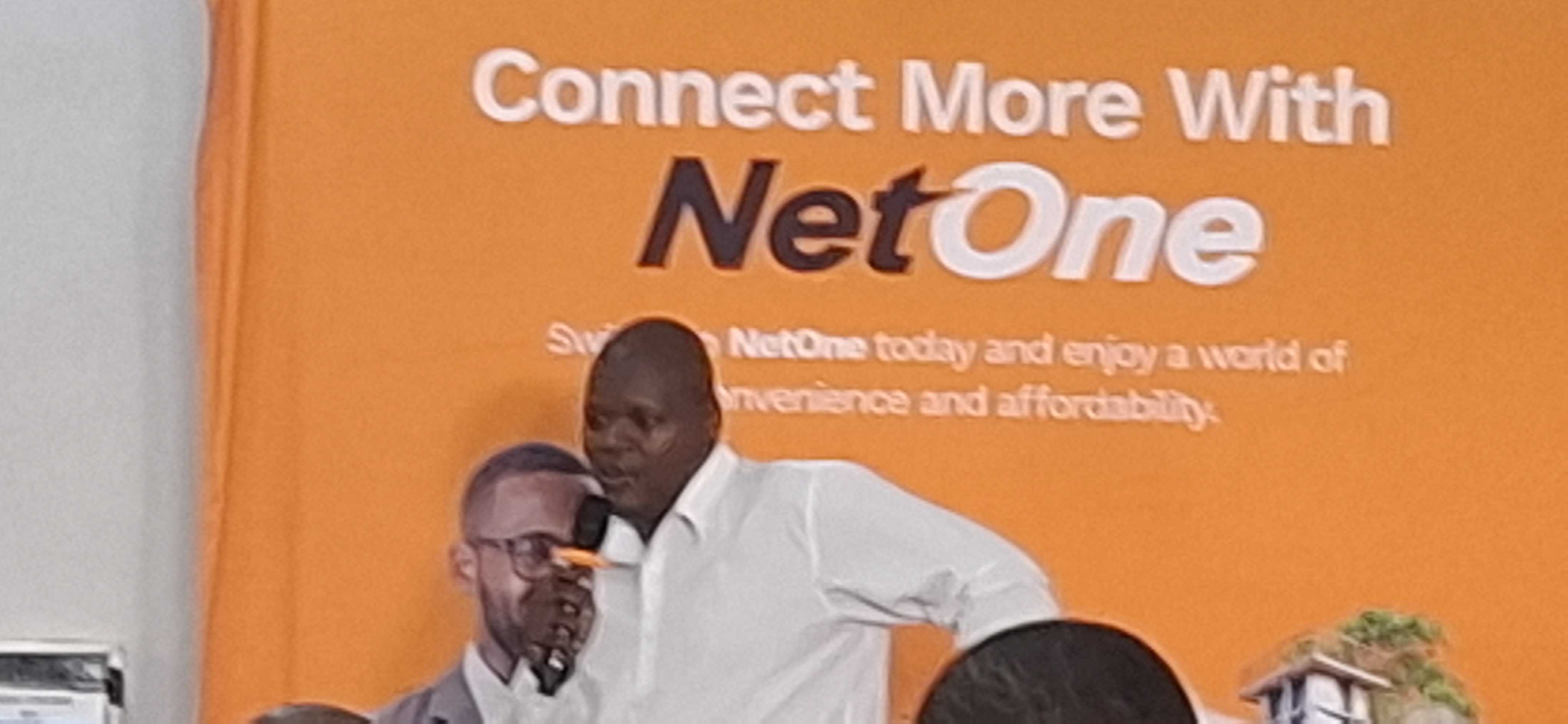


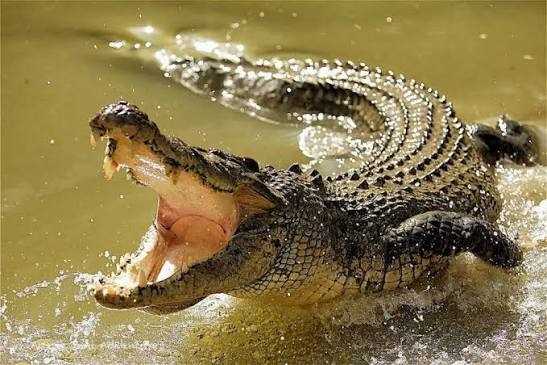
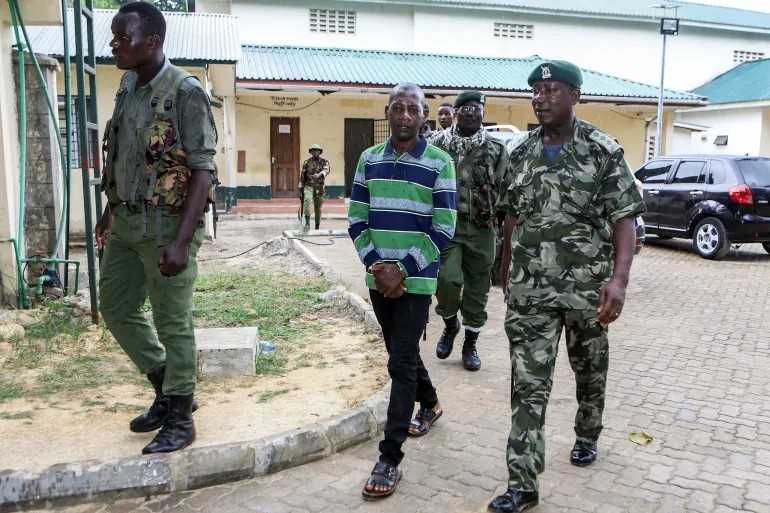



Leave Comments